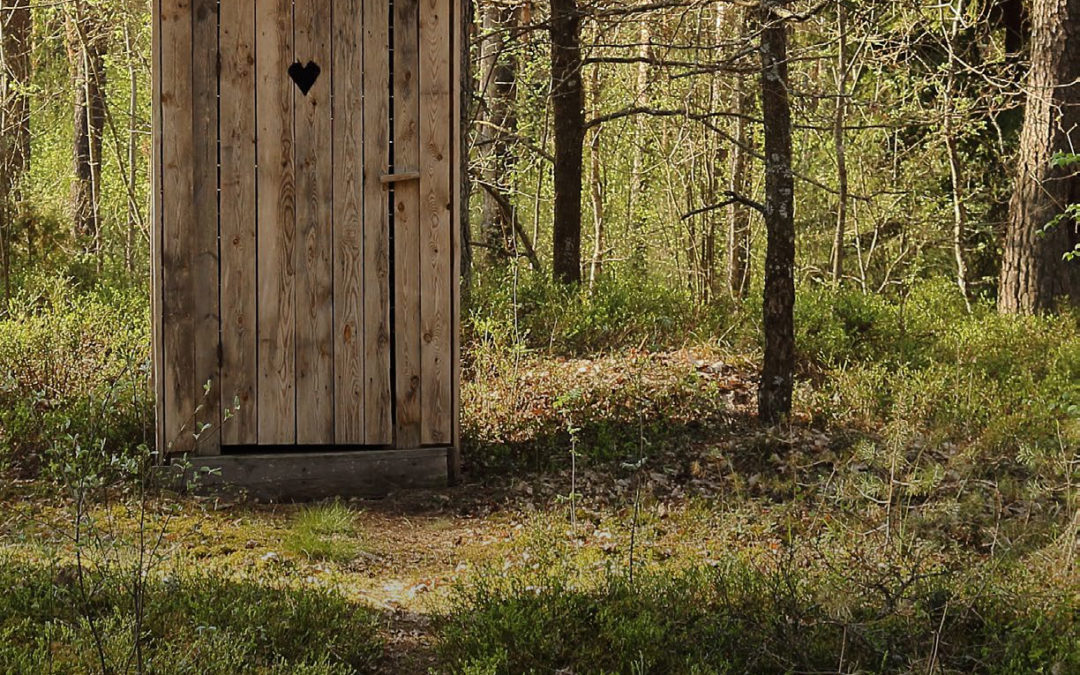by Helen J. Hollingsworth—
Before I joined the Lutheran church back in my early 20s, I flew to a tiny island in the Caribbean. It was my first mission trip, sponsored by the denomination to which I then belonged. I arrived on the island, full of Holy Spirit vigor and youthful enthusiasm. I also came laden with Christian literature, which I dispensed across the island every morning along with what I thought to be important speeches for people to heed the word of God.
One night, during a church song service, a torrential rain descended upon us. It was as if an ocean in the sky had overflowed. Undaunted, we sang, “Satan, you can’t prevail,” and raised our clenched fists in the air at every mention of the enemy’s name. After a round of choruses, the rain stopped as suddenly as it began. Taking this as a sign from heaven, we continued more zealously than before.
I was happier than an ant at a picnic. There was only one problem. Much of the island lacked indoor toilets. I was staying at a home that had indoor plumbing, but many of the homes I visited did not. Often I would refrain from “going” until I could return to my host home. In this uncomfortable condition, sometimes I trekked several miles back to my host home in the torrid summer heat, just for the indoor facilities. I considered this my way of “suffering for Christ.”
Then came a day when I was at the home of a young man who noticed my agitation. “Do you need to use my latrine?” he asked. I said yes; I couldn’t wait any longer. I entered the outhouse but exited just as quickly, overcome by the heat and the stench. Swallowing hard and covering my mouth, I forced back what was about to erupt. As I headed to my host home, the young man walked with me and told me this story.
Years before, he had found a baby rabbit. He took the rabbit home and nursed it. “For a long time, the rabbit was my only friend,” he said shyly. But then one day he couldn’t find his rabbit. After a long search, he discovered that the rabbit had fallen down the hole in the latrine. Covered with dung, the rabbit at first appeared lifeless. The young man told me that the only way to get his friend out was to climb in to extract him. So that is what he did.
That afternoon, as I lay down to rest, I reflected on the young man and his beloved rabbit. I began to cry and pray, asking for God’s forgiveness. I realized why the young man had told me this story. How arrogant and self-righteous I’d been in my approach to ministry when I arrived in his country!
Putting myself in his story, I saw that I was not like the young man. No, I was like the rabbit—mired in sewage and unable to help myself. I knew that Christ was the one who had redeemed me and delivered me from sin. And what is sin—mine or that of any other—but a stinky mess into which we have fallen and from which we can’t extract ourselves? “All have sinned and fall short of the glory of God,” we are told in Romans 3:23.
In the song service later that night, I didn’t need to shake my fist at Satan. I lifted my hands in grateful worship to my Lord and Savior, who has saved me—and all of us—from the death grip of sin. As the apostle Paul writes in Ephesians 2:8–9, “For by grace you have been saved through faith, and this is not your own doing; it is the gift of God—not the result of works, so that no one may boast.” This is most certainly true.
These days I am a retired ELCA pastor. Over and over, I have seen what at first escaped me in those early, eager, unaware years. Simply this: Mission must always be approached as a “we” offering, not a “them” project. Ministry is our response to the enduring, unflinching love of God, who goes there—however messy “there” may be—with us. Ministry is an undertaking we do with others, serving one another mutually. We engage in it with an understanding that “they” are really “us”—even when we need God to help us see it.
The Rev. Helen J. Hollingsworth discovered 45 years ago that God loves her. Before that, she was just like a church pew—sitting in the sanctuary, but wooden and lifeless. Retired from official pastoral duties, she teaches online and operates a community food bank.
This article is excerpted from the November 2020 issue of Gather magazine. To read more like it, subscribe to Gather.
Seen. Heard. Welcomed.
Do you ever go to church hoping you have enough snacks and “stuff” to keep your child quiet and...
Redeeming grace
Coupons, rainchecks and rebates were my dad’s way of saving money on groceries and other household...
Holding to God’s promise
When my husband, Joe, and I moved into our first house In May 2014, we spied squash vines growing...






I so loved the Down the rabbit hole and screwed up my nose at parts of it but I realize that life is like that messy and smelly but we live through it .God gives a beautiful world to us and we need to stand still and just look closely at it .There are ups and downs God will see us to the end .